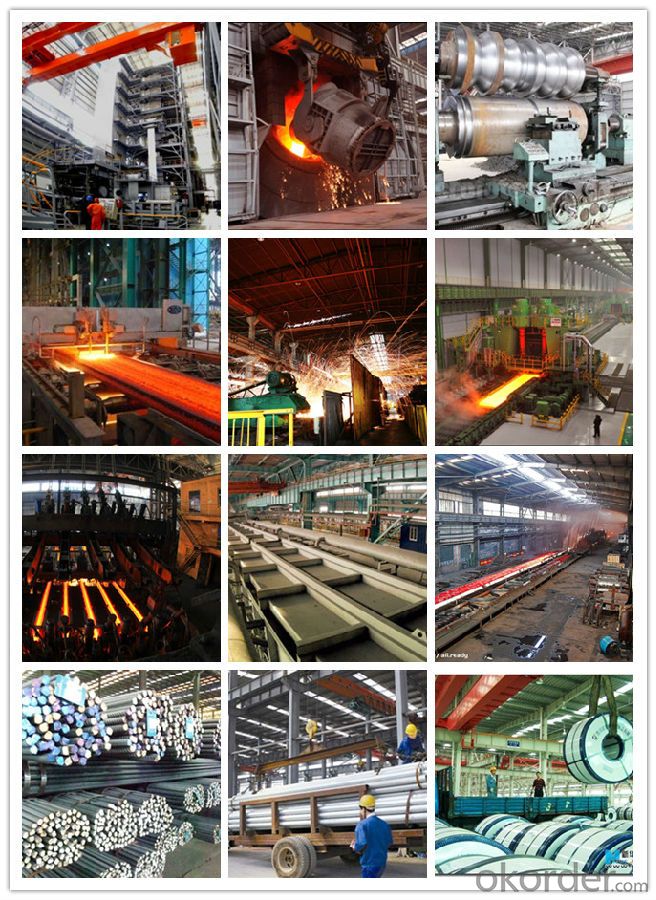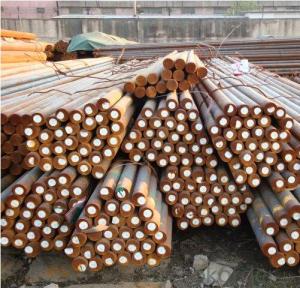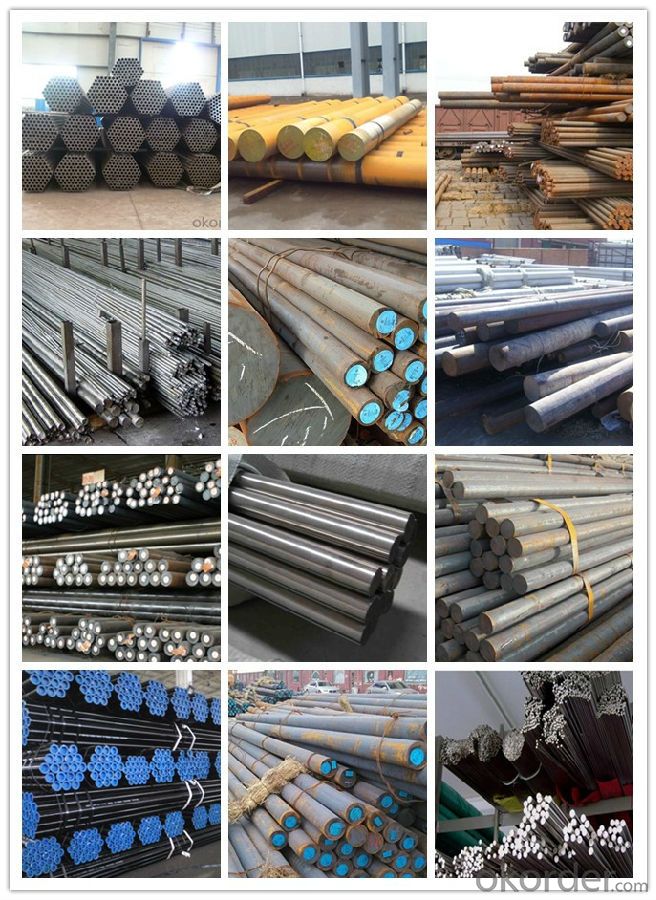Special Steel SAE8620 Alloy Structual Steel Round
- Loading Port:
- China main port
- Payment Terms:
- TT OR LC
- Min Order Qty:
- 30 m.t.
- Supply Capability:
- 10000 m.t./month
OKorder Service Pledge
OKorder Financial Service
You Might Also Like
Item specifice
Specifications
8620 steel round bars
1.Diameter:12~600mm
2.Delivery Conditon:annealed, black/turned surface
3.Short Delivery Time
Product information
| AISI 8620 steel flats | |||||||
| Chemical Composition(%) | |||||||
| C | Si | Mn | P | S | Cr | Mo | Ni |
| 0.38-0.43 | 0.15-0.35 | 0.60-0.80 | ≤0.030 | ≤0.030 | 0.70-0.90 | 0.20-0.30 | 1.65-2.00 |
| Heat Treatment | |||||||
| annealed, Q+T | |||||||
| Melting Process | |||||||
| 1. EAF: Electric Furnace+LF+VD(Optional) | |||||||
| 2. ESR: Electric Furnace+LF+VD+Eleroslag Remelted(Optional) | |||||||
| UT Class | |||||||
| According to Standard of SEP 1921/84,100% Volume, Level C/c, D/d or E/e | |||||||
| Tolerance on Quantity | |||||||
| +/-10% Per Size | |||||||
Product show
Workshop show

Shipping
1. FedEx/DHL/UPS/TNT for samples, Door-to-Door;
2. By Air or by Sea for batch goods, for FCL; Airport/ Port receiving;
3. Customers specifying freight forwarders or negotiable shipping methods!
Delivery Time: 3-7 days for samples; 5-25 days for batch goods.
Payment Terms
1.Payment: T/T, L/C, Western Union, MoneyGram,PayPal; 30% deposits; 70% balance before delivery.
2.MOQ: 1pcs
3.Warranty : 3 years
4.Package Informations: 1) EXPORT, In 20 feet (GW 25 ton) or 40 feet Container (GW 25 ton)
2)as customer's requirement
Why choose us?
(1) The leading exporter in China special steel industry.
(2) Large stocks for various sizes, fast delivery date.
(3) Good business relationship with China famous factories.
(4) More than 7 years steel exporting experience.
(5) Good after-sales service guarantee.
- Q:What are the different forging techniques for special steel parts?
- To produce special steel parts, there are various forging techniques available, which depend on the desired shape, size, and properties of the final product. Some commonly used techniques for forging special steel parts include: 1. Utilizing open-die forging involves shaping the metal between flat dies or anvils. It is suitable for simpler shapes and provides flexibility in producing a wide range of sizes. 2. Closed-die forging, also known as impression-die forging, involves shaping the metal within a closed die that contains the desired shape and allows for higher precision. It is commonly used for producing complex and intricate shapes. 3. Upset forging involves compressing and shaping the metal by applying pressure to the ends of the workpiece. This technique is often used to create parts with increased diameter or reduced length, such as bolts and nails. 4. Ring rolling is a technique that shapes a cylindrical workpiece by applying pressure from rotating rolls. It is commonly used for producing seamless rings with enhanced strength and durability, for example, gears, bearings, and flanges. 5. Isothermal forging is performed by forging the metal at a constant temperature, usually within a specially designed furnace. This technique allows for precise control over the metallurgical properties of the final product, resulting in improved mechanical properties and reduced residual stress. 6. Precision forging, also known as near-net-shape forging, uses specially designed dies to produce parts with minimal finishing operations. It is commonly used for complex shapes and high-volume production, ensuring cost-effectiveness and dimensional accuracy. 7. Press forging involves shaping the metal by applying pressure through a mechanical or hydraulic press. It allows for precise control over the forging process and is often used for producing high-strength, large-sized components. Each of these forging techniques offers unique advantages and is suitable for different applications. The appropriate selection of the forging technique for special steel parts depends on factors such as the desired shape, size, strength, and cost-effectiveness of the final product.
- Q:How does special steel perform in mining applications?
- Special steel, also known as alloy steel, is highly advantageous in mining applications due to its unique properties and performance capabilities. First and foremost, special steel exhibits exceptional strength and hardness, making it highly resistant to wear, abrasion, and impact. This durability is crucial in mining operations where heavy machinery, such as crushers, conveyors, and drills, are constantly exposed to harsh and abrasive materials like rocks and ores. Special steel's ability to withstand these extreme conditions minimizes the need for frequent repairs and replacements, thus reducing downtime and increasing productivity. Additionally, special steel possesses excellent corrosion resistance, which is particularly beneficial in mining applications where equipment is exposed to moisture, chemicals, and other corrosive substances. This corrosion resistance ensures the longevity and reliability of mining equipment, reducing maintenance costs and increasing operational efficiency. Moreover, special steel offers good heat resistance and high-temperature stability, enabling it to withstand intense heat generated during mining operations, such as drilling, cutting, and welding. This heat resistance prevents deformation and structural failure of equipment, ensuring the safety of miners and the overall integrity of mining operations. Furthermore, special steel can be tailored and customized to meet specific requirements of mining applications. Its versatility allows for the creation of specialized components and parts that are optimized for specific mining processes, enhancing performance and efficiency. Whether it is high-strength steel for heavy-duty equipment or corrosion-resistant steel for pipelines and storage tanks, special steel can be engineered to fulfill the unique demands of mining operations. In conclusion, special steel's exceptional strength, hardness, corrosion resistance, heat resistance, and versatility make it an ideal material for mining applications. Its ability to withstand extreme conditions, resist wear and corrosion, and deliver superior performance significantly contributes to the efficiency, reliability, and safety of mining operations.
- Q:What are the different annealing techniques used for special steel?
- There are several annealing techniques used for special steel, including full annealing, spheroidizing annealing, and stress relieving annealing. Full annealing involves heating the steel to a high temperature and then slowly cooling it, which helps to refine the grain structure and reduce internal stresses. Spheroidizing annealing is used to soften the steel and improve machinability by forming spherical carbides within the microstructure. Stress relieving annealing is performed to reduce residual stresses in the steel, typically after significant machining or welding operations. These different techniques allow for the customization of special steel properties to meet specific application requirements.
- Q:How is mold steel used in the production of plastic injection molds?
- Mold steel is used in the production of plastic injection molds as it provides the necessary hardness, durability, and heat resistance required for the molding process. It ensures the molds can withstand the high pressures and temperatures involved in plastic injection molding, allowing for the precise and efficient production of plastic parts.
- Q:How does the heat treatment process affect special steel?
- The heat treatment process greatly affects special steel by altering its microstructure, improving its mechanical properties, and enhancing its overall performance. The process involves heating the steel to a specific temperature and then cooling it at a controlled rate. This changes the steel's internal structure, making it stronger, more durable, and resistant to wear and corrosion. Additionally, heat treatment can modify the steel's hardness, toughness, and flexibility, making it suitable for specific applications such as cutting tools, automotive parts, or aerospace components.
- Q:How does special steel contribute to the aerospace landing gear industry?
- Special steel plays a crucial role in the aerospace landing gear industry by providing the necessary strength, durability, and resistance to extreme conditions that are required for safe and efficient aircraft landings. One of the key requirements for landing gears is high tensile strength, as they must bear the weight of the aircraft during takeoff, landing, and taxiing. Special steel alloys, such as ultra-high strength steels, are specifically designed to resist deformation and withstand the enormous forces exerted on the landing gear. These steels have exceptional mechanical properties, allowing them to maintain their structural integrity under heavy loads. Moreover, special steel used in aerospace landing gears must exhibit excellent fatigue resistance to withstand the repeated stress cycles experienced during each landing. Fatigue failure of landing gears can have catastrophic consequences, so the use of high-quality steel ensures extended service life and reduces the risk of failure. In addition to strength and fatigue resistance, special steel alloys used in landing gears must possess exceptional corrosion resistance. Aircraft operate in various environments, including humid and salty conditions, which can accelerate corrosion. By using corrosion-resistant steels, the landing gear components can withstand these harsh conditions and maintain their performance and safety over time. Furthermore, the unique properties of special steel alloys allow for weight reduction in landing gear components. Aerospace industry continuously strives to reduce aircraft weight to improve fuel efficiency and performance. Special steel alloys, like high-strength low-alloy (HSLA) steels, offer the perfect balance between strength and weight, allowing for the design of lighter landing gear components without compromising safety or durability. In summary, special steel is crucial to the aerospace landing gear industry as it provides the necessary strength, fatigue resistance, corrosion resistance, and weight reduction capabilities required for safe and efficient aircraft landings. By using special steel alloys, the industry can ensure the reliability and longevity of landing gear components, contributing to the overall safety and performance of aircraft.
- Q:How is the hardness of special steel measured?
- The hardness of special steel is typically measured using methods such as Rockwell, Brinell, or Vickers hardness tests, which involve indenting the steel surface with a known force and measuring the resulting indentation size.
- Q:Can special steel be used for making renewable energy equipment?
- Yes, special steel can be used for making renewable energy equipment. Special steel, also known as high-performance or alloy steel, offers a range of properties that make it suitable for use in various renewable energy applications. For example, in wind energy, special steel can be used to manufacture wind turbine components such as rotor blades, tower structures, and drive train systems. The high strength and corrosion resistance of special steel ensure the durability and longevity of these components, which are exposed to harsh weather conditions and continuous mechanical stress. In solar energy, special steel can be utilized in the construction of solar panels, support structures, and tracking systems. The material's excellent thermal conductivity and resistance to deformation make it ideal for efficiently capturing and converting solar energy into electricity. Additionally, special steel can be employed in the production of hydroelectric power equipment, such as turbine blades, runners, and penstocks. Its high tensile strength and resistance to erosion and cavitation enable these components to withstand the forces and pressures associated with water power generation. Furthermore, when it comes to biomass energy, special steel can be used in the fabrication of bioenergy plants and equipment. Its heat resistance and corrosion properties make it suitable for handling high temperatures and corrosive substances involved in the biomass conversion process. Overall, special steel's unique combination of strength, durability, corrosion resistance, and thermal properties make it an excellent choice for manufacturing renewable energy equipment, contributing to the development and sustainability of the renewable energy industry.
- Q:How is special steel manufactured?
- Special steel is manufactured through a complex process that involves melting, refining, and shaping steel with precise chemical compositions and desired properties. This may include alloying steel with various elements, such as chromium, nickel, or molybdenum, to enhance its strength, corrosion resistance, or heat resistance. The steel is then formed into desired shapes through techniques like rolling, forging, or casting. The manufacturing process also involves strict quality control measures to ensure the final product meets the specific requirements of various industries, such as automotive, aerospace, or construction.
- Q:How does special steel perform under high temperatures?
- Special steel is known for its excellent performance under high temperatures. It has a high melting point, allowing it to withstand extreme heat without deforming or losing its structural integrity. Additionally, special steel exhibits exceptional strength and resistance to oxidation, making it highly dependable for applications that require stability and durability at elevated temperatures.
1. Manufacturer Overview |
|
|---|---|
| Location | |
| Year Established | |
| Annual Output Value | |
| Main Markets | |
| Company Certifications | |
2. Manufacturer Certificates |
|
|---|---|
| a) Certification Name | |
| Range | |
| Reference | |
| Validity Period | |
3. Manufacturer Capability |
|
|---|---|
| a)Trade Capacity | |
| Nearest Port | |
| Export Percentage | |
| No.of Employees in Trade Department | |
| Language Spoken: | |
| b)Factory Information | |
| Factory Size: | |
| No. of Production Lines | |
| Contract Manufacturing | |
| Product Price Range | |
Send your message to us
Special Steel SAE8620 Alloy Structual Steel Round
- Loading Port:
- China main port
- Payment Terms:
- TT OR LC
- Min Order Qty:
- 30 m.t.
- Supply Capability:
- 10000 m.t./month
OKorder Service Pledge
OKorder Financial Service
Similar products
New products
Hot products
Related keywords































